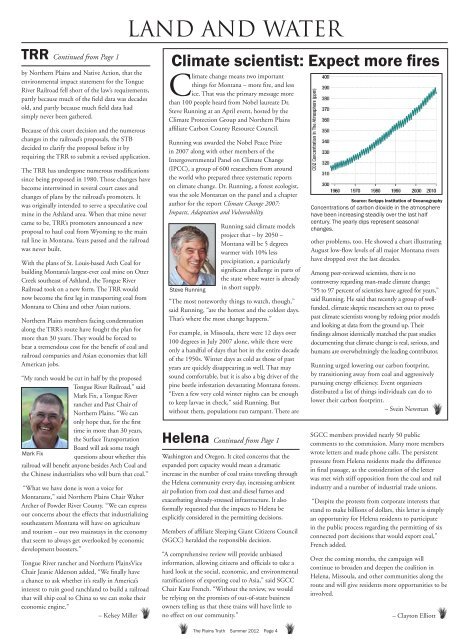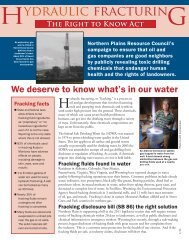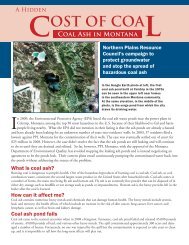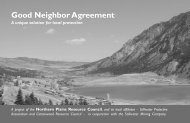Summer - Northern Plains Resource Council
Summer - Northern Plains Resource Council
Summer - Northern Plains Resource Council
Create successful ePaper yourself
Turn your PDF publications into a flip-book with our unique Google optimized e-Paper software.
TRR Continued from Page 1<br />
by <strong>Northern</strong> <strong>Plains</strong> and Native Action, that the<br />
environmental impact statement for the Tongue<br />
River Railroad fell short of the law’s requirements,<br />
partly because much of the field data was decades<br />
old, and partly because much field data had<br />
simply never been gathered.<br />
Because of this court decision and the numerous<br />
changes in the railroad’s proposals, the STB<br />
decided to clarify the proposal before it by<br />
requiring the TRR to submit a revised application.<br />
The TRR has undergone numerous modifications<br />
since being proposed in 1980. Those changes have<br />
become intertwined in several court cases and<br />
changes of plans by the railroad’s promoters. It<br />
was originally intended to serve a speculative coal<br />
mine in the Ashland area. When that mine never<br />
came to be, TRR’s promoters announced a new<br />
proposal to haul coal from Wyoming to the main<br />
rail line in Montana. Years passed and the railroad<br />
was never built.<br />
With the plans of St. Louis-based Arch Coal for<br />
building Montana’s largest-ever coal mine on Otter<br />
Creek southeast of Ashland, the Tongue River<br />
Railroad took on a new form. The TRR would<br />
now become the first leg in transporting coal from<br />
Montana to China and other Asian nations.<br />
<strong>Northern</strong> <strong>Plains</strong> members facing condemnation<br />
along the TRR’s route have fought the plan for<br />
more than 30 years. They would be forced to<br />
bear a tremendous cost for the benefit of coal and<br />
railroad companies and Asian economies that kill<br />
American jobs.<br />
“My ranch would be cut in half by the proposed<br />
Tongue River Railroad,” said<br />
Mark Fix, a Tongue River<br />
rancher and Past Chair of<br />
<strong>Northern</strong> <strong>Plains</strong>. “We can<br />
only hope that, for the first<br />
time in more than 30 years,<br />
the Surface Transportation<br />
Board will ask some tough<br />
Mark Fix<br />
questions about whether this<br />
railroad will benefit anyone besides Arch Coal and<br />
the Chinese industrialists who will burn that coal.”<br />
“What we have done is won a voice for<br />
Montanans,” said <strong>Northern</strong> <strong>Plains</strong> Chair Walter<br />
Archer of Powder River County. “We can express<br />
our concerns about the effects that industrializing<br />
southeastern Montana will have on agriculture<br />
and tourism – our two mainstays in the economy<br />
that seem to always get overlooked by economic<br />
development boosters.”<br />
Tongue River rancher and <strong>Northern</strong> <strong>Plains</strong>Vice<br />
Chair Jeanie Alderson added, “We finally have<br />
a chance to ask whether it’s really in America’s<br />
interest to ruin good ranchland to build a railroad<br />
that will ship coal to China so we can stoke their<br />
economic engine.”<br />
– Kelsey Miller<br />
Land and water<br />
Climate scientist: Expect more fires<br />
Climate change means two important<br />
things for Montana – more fire, and less<br />
ice. That was the primary message more<br />
than 100 people heard from Nobel laureate Dr.<br />
Steve Running at an April event, hosted by the<br />
Climate Protection Group and <strong>Northern</strong> <strong>Plains</strong><br />
affiliate Carbon County <strong>Resource</strong> <strong>Council</strong>.<br />
Running was awarded the Nobel Peace Prize<br />
in 2007 along with other members of the<br />
Intergovernmental Panel on Climate Change<br />
(IPCC), a group of 600 researchers from around<br />
the world who prepared three systematic reports<br />
on climate change. Dr. Running, a forest ecologist,<br />
was the sole Montanan on the panel and a chapter<br />
author for the report Climate Change 2007:<br />
Impacts, Adaptation and Vulnerability.<br />
Steve Running<br />
Running said climate models<br />
project that – by 2050 –<br />
Montana will be 5 degrees<br />
warmer with 10% less<br />
precipitation, a particularly<br />
significant challenge in parts of<br />
the state where water is already<br />
in short supply.<br />
“The most noteworthy things to watch, though,”<br />
said Running, “are the hottest and the coldest days.<br />
That’s where the most change happens.”<br />
For example, in Missoula, there were 12 days over<br />
100 degrees in July 2007 alone, while there were<br />
only a handful of days that hot in the entire decade<br />
of the 1950s. Winter days as cold as those of past<br />
years are quickly disappearing as well. That may<br />
sound comfortable, but it is also a big driver of the<br />
pine beetle infestation devastating Montana forests.<br />
“Even a few very cold winter nights can be enough<br />
to keep larvae in check,” said Running. But<br />
without them, populations run rampant. There are<br />
Helena Continued from Page 1<br />
Washington and Oregon. It cited concerns that the<br />
expanded port capacity would mean a dramatic<br />
increase in the number of coal trains traveling through<br />
the Helena community every day, increasing ambient<br />
air pollution from coal dust and diesel fumes and<br />
exacerbating already-stressed infrastructure. It also<br />
formally requested that the impacts to Helena be<br />
explicitly considered in the permitting decisions.<br />
Members of affiliate Sleeping Giant Citizens <strong>Council</strong><br />
(SGCC) heralded the responsible decision.<br />
“A comprehensive review will provide unbiased<br />
information, allowing citizens and officials to take a<br />
hard look at the social, economic, and environmental<br />
ramifications of exporting coal to Asia,” said SGCC<br />
Chair Kate French. “Without the review, we would<br />
be relying on the promises of out-of-state business<br />
owners telling us that these trains will have little to<br />
no effect on our community.”<br />
Source: Scripps Institution of Oceanography<br />
Concentrations of carbon dioxide in the atmosphere<br />
have been increasing steadily over the last half<br />
century. The yearly dips represent seasonal<br />
changes.<br />
other problems, too. He showed a chart illustrating<br />
August low-flow levels of all major Montana rivers<br />
have dropped over the last decades.<br />
Among peer-reviewed scientists, there is no<br />
controversy regarding man-made climate change;<br />
“95 to 97 percent of scientists have agreed for years,”<br />
said Running. He said that recently a group of wellfunded,<br />
climate skeptic researchers set out to prove<br />
past climate scientists wrong by redoing prior models<br />
and looking at data from the ground up. Their<br />
findings almost identically matched the past studies<br />
documenting that climate change is real, serious, and<br />
humans are overwhelmingly the leading contributor.<br />
Running urged lowering our carbon footprint,<br />
by transitioning away from coal and aggressively<br />
pursuing energy efficiency. Event organizers<br />
distributed a list of things individuals can do to<br />
lower their carbon footprint.<br />
– Svein Newman<br />
SGCC members provided nearly 50 public<br />
comments to the commission. Many more members<br />
wrote letters and made phone calls. The persistent<br />
pressure from Helena residents made the difference<br />
in final passage, as the consideration of the letter<br />
was met with stiff opposition from the coal and rail<br />
industry and a number of industrial trade unions.<br />
“Despite the protests from corporate interests that<br />
stand to make billions of dollars, this letter is simply<br />
an opportunity for Helena residents to participate<br />
in the public process regarding the permitting of six<br />
connected port decisions that would export coal,”<br />
French added.<br />
Over the coming months, the campaign will<br />
continue to broaden and deepen the coalition in<br />
Helena, Missoula, and other communities along the<br />
route and will give residents more opportunities to be<br />
involved.<br />
– Clayton Elliott<br />
The <strong>Plains</strong> Truth <strong>Summer</strong> 2012 Page 4





